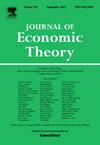Two time-consistent Paretian solutions to the intertemporal resource allocation problem
IF 1.2
3区 经济学
Q3 ECONOMICS
引用次数: 0
Abstract
We study the problem of aggregating individual geometric discounting (GD) preferences over infinite streams of consumption profiles into a system specifying, for each consumption history, a social ranking of the streams that follow that history. Such a system is time-consistent if and only if it is generated by a single underlying preference ordering over the lifetime streams. Under the Weak Pareto Principle, Neutrality, Anonymity, and Discounting Irrelevance (individual discount factors do not affect the ranking of constant streams), lifetime streams must be ranked by applying a fixed monotonic and symmetric ordering to the profiles of range-normalized GD utilities they yield (Theorem 1). History Independence singles out the range-normalized utilitarian rule (Theorem 2) whereas the range-normalized Nash rule is characterized by Independence of Infeasible Consumptions (the ranking of streams delivering consumption profiles in an interval from the origin does not depend on individual valuations outside that interval) or Valuation Irrelevance (the ranking of pure timing streams is independent of individual valuations) (Theorem 3).
跨期资源分配问题的两个时间一致Paretian解
我们研究的问题是将个人几何折扣(GD)偏好在无限的消费概况流中聚合到一个系统中,为每个消费历史指定一个遵循该历史的流的社会排名。这样的系统是时间一致的,当且仅当它是由生命周期流上的单个底层首选项排序生成的。在弱帕累托原则、中立性、匿名性和贴现无关性(单个贴现因素不影响恒定流的排名)下,生命周期流必须通过对它们产生的范围归一化GD效用的概况应用固定的单调和对称排序来排名(定理1)。历史独立性挑选出范围归一化的实用规则(定理2),而范围归一化的纳什规则的特点是不可行的消费独立性(从原点开始的间隔内提供消费概况的流的排名不依赖于该间隔之外的个人估值)或估值无关性(纯定时流的排名独立于个人估值)(定理3)。
本文章由计算机程序翻译,如有差异,请以英文原文为准。
求助全文
约1分钟内获得全文
求助全文
来源期刊

Journal of Economic Theory
ECONOMICS-
CiteScore
2.50
自引率
12.50%
发文量
135
期刊介绍:
The Journal of Economic Theory publishes original research on economic theory and emphasizes the theoretical analysis of economic models, including the study of related mathematical techniques. JET is the leading journal in economic theory. It is also one of nine core journals in all of economics. Among these journals, the Journal of Economic Theory ranks fourth in impact-adjusted citations.
 求助内容:
求助内容: 应助结果提醒方式:
应助结果提醒方式:


